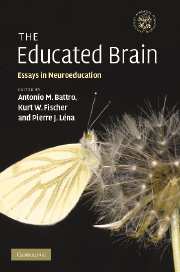Book contents
- Frontmatter
- Contents
- List of figures
- List of tables
- List of contributors
- Preface
- Foreword: Towards a new pedagogical and didactic approach
- Part I The mind, brain, and education triad
- 1 Introduction: Mind, brain, and education in theory and practice
- 2 Historical considerations on brain and self
- 3 Building bridges in neuroeducation
- 4 Mind, brain, and consciousness
- 5 Understanding mind, brain, and education as a complex, dynamic developing system: Measurement, modeling, and research
- Part II Brain development, cognition, and education
- Part III Brain, language, and mathematics
- Index
- References
2 - Historical considerations on brain and self
from Part I - The mind, brain, and education triad
Published online by Cambridge University Press: 22 September 2009
- Frontmatter
- Contents
- List of figures
- List of tables
- List of contributors
- Preface
- Foreword: Towards a new pedagogical and didactic approach
- Part I The mind, brain, and education triad
- 1 Introduction: Mind, brain, and education in theory and practice
- 2 Historical considerations on brain and self
- 3 Building bridges in neuroeducation
- 4 Mind, brain, and consciousness
- 5 Understanding mind, brain, and education as a complex, dynamic developing system: Measurement, modeling, and research
- Part II Brain development, cognition, and education
- Part III Brain, language, and mathematics
- Index
- References
Summary
Overview
This chapter explores some historical developments concerning ideas about the connection between brain and self, and suggests that they constitute the background – and, indeed, the historical and intellectual conditions of possibility – for projects, such as the one that inspires this volume on the “educated brain,” aimed at integrating the neurosciences with (or into) traditional areas of the human sciences. Such integration can be conceived of in reductionistic terms (the area in question, e.g. education or psychoanalysis, is to be entirely reformed on the basis of neuroscientific knowledge, and to be made dependent on advancements in the neurosciences), or in more collaborative terms (the human sciences maintain their epistemic and methodological independence, but are to be enriched and partially modified by available neuroscientific information). If the neurosciences seem so crucial, it is ultimately because – beyond what is relevant for each area of application or cooperation – they show the extent to which the brain is a fundamental organ for the constitution of human personhood. The author suggests, however, that the significance which the neurosciences have gained is, at least in part, dependent on the belief that one's own brain is the only organ each of us needs in order to be himself or herself. Such a belief is obviously supported by neuroscientific findings, but did not originate in them; on the contrary, it precedes modern knowledge of the brain. This might sound counterintuitive, but if it is indeed the case, then history should help us understand the roots, as well as the implicit values and beliefs of contemporary enthusiasm about the consequences of the neurosciences for other disciplines.
The Editors
- Type
- Chapter
- Information
- The Educated BrainEssays in Neuroeducation, pp. 20 - 42Publisher: Cambridge University PressPrint publication year: 2008
References
- 3
- Cited by

